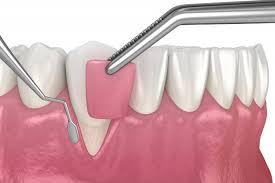Sponsor
Types of Gum Surgery and Which One You Might Need

Gum health plays a vital role in maintaining overall oral hygiene. When gum disease advances or gum tissue becomes damaged, surgery might be necessary to restore both function and aesthetics. At places like Montclair Dental Spa NJ, patients can access state-of-the-art treatments tailored to their specific periodontal needs. This article will explore the types of gum surgery available, what each involves, and who might benefit from them — including the increasingly popular gum implant surgery.
Why Gum Surgery Might Be Necessary
Gum surgery is typically recommended when non-surgical treatments like deep cleaning (scaling and root planing) are not enough to manage periodontal disease. It's also essential in cases involving:
-
Advanced gum disease (periodontitis)
-
Gum recession
-
Bone loss around teeth
-
Gummy smile correction
-
Preparing for dental implants
If left untreated, gum disease can lead to tooth loss, infection, and even systemic health problems like heart disease and diabetes. That’s why professionals at clinics like Montclair Dental Spa NJ advocate for early intervention and personalized treatment plans.
1. Flap Surgery (Pocket Reduction Surgery)
What It Is:
Flap surgery involves making small incisions in the gums to lift back the tissue and remove tartar and bacteria from underneath. This is followed by repositioning the gums to fit more snugly around the teeth.
Who Needs It:
Patients with deep periodontal pockets and moderate to severe periodontitis often require flap surgery. It allows dentists to clean the root surfaces and repair bone damage if necessary.
Benefits:
-
Reduces gum pocket depth
-
Makes future cleaning easier
-
Slows or stops the progression of gum disease
2. Gum Graft Surgery
What It Is:
Gum grafting addresses gum recession by taking tissue (usually from the roof of the mouth) and attaching it to the affected area. This helps cover exposed roots and restore gumline aesthetics.
Who Needs It:
People suffering from receding gums — often caused by aggressive brushing, genetics, or gum disease — are ideal candidates. Recession not only affects appearance but also increases sensitivity and risk of tooth decay.
Benefits:
-
Protects roots from exposure
-
Reduces tooth sensitivity
-
Enhances smile aesthetics
3. Regenerative Surgery (Bone Grafting and Tissue Regeneration)
What It Is:
This surgery helps regenerate lost bone and gum tissue due to advanced periodontal disease. It may involve bone grafts, membrane placement, or the use of growth-stimulating proteins.
Who Needs It:
Patients with significant bone loss, especially those planning to receive dental implants, can benefit from regenerative procedures.
Benefits:
-
Encourages natural regrowth of bone and tissue
-
Prepares mouth for successful implant placement
-
Prevents tooth loss and facial structure deterioration
4. Crown Lengthening
What It Is:
Crown lengthening reshapes gum tissue and sometimes bone to expose more of a tooth’s surface. This may be done for restorative purposes (like placing a crown) or cosmetic reasons (reducing a "gummy" smile).
Who Needs It:
Patients who need to restore broken or decayed teeth below the gumline or those wanting to correct uneven gums for aesthetic purposes.
Benefits:
-
Makes dental restorations possible
-
Improves smile appearance
-
Increases tooth exposure for better hygiene
5. Gum Contouring and Laser Surgery
What It Is:
Gum contouring uses lasers or surgical tools to reshape the gumline. This procedure is minimally invasive and often performed for cosmetic reasons.
Who Needs It:
Patients with uneven gums, excessive gum tissue, or those ***ring a more symmetrical smile can benefit from contouring.
Benefits:
-
Minimally invasive and less painful
-
Quick recovery time
-
Dramatic aesthetic improvements
6. Gum Implant Surgery
What It Is:
Gum implant surgery refers to procedures where synthetic or donor tissue is used to rebuild areas of severe gum loss. It may also refer to soft tissue grafting done in preparation for dental implants.
Who Needs It:
This surgery is beneficial for patients with severe gum recession who don’t have enough tissue for a standard gum graft. It’s also ideal for individuals preparing for dental implants where gum support is necessary.
Benefits:
-
Restores natural gum contours
-
Strengthens gum support for implants
-
Enhances both function and smile appearance
At Montclair Dental Spa NJ, gum implant surgery is performed with precision and care, using biocompatible materials and cutting-edge technology for optimal results.
Choosing the Right Type of Gum Surgery
Not all gum surgeries are suitable for everyone. The type of procedure needed depends on several factors:
-
Severity of Gum Disease: Mild cases might need only a deep cleaning, while advanced periodontitis may require flap surgery or regeneration.
-
Aesthetic Concerns: If the issue is cosmetic, such as a gummy smile, contouring or crown lengthening may be sufficient.
-
Bone and Tissue Loss: More complex surgeries like bone grafting or gum implants are needed for extensive loss.
-
Future Dental Plans: If you plan to get dental implants, your gums and bones must be strong enough to support them — sometimes requiring preparatory procedures.
That’s why a professional consultation is essential. Clinics like Montclair Dental Spa NJ conduct thorough evaluations, including digital imaging and periodontal charting, to recommend the best treatment.
Recovery and Aftercare
Recovery varies depending on the procedure performed. However, general aftercare includes:
-
Pain Management: Over-the-counter or prescribed painkillers
-
Diet Modifications: Soft foods and cold drinks
-
Oral Hygiene: Gentle brushing and antibacterial rinses
-
Follow-Up Visits: Monitoring healing progress and removing stitches if necessary
Patients are also advised to quit smoking and manage health conditions like diabetes, which can affect gum healing.
Final Thoughts
Gum surgery can be life-changing — not just in terms of oral health, but also in self-confidence and comfort. Whether you’re dealing with gum recession, periodontal disease, or planning for implants, understanding the different types of gum surgery can help you make informed decisions.
If you’re unsure which procedure you might need, schedule a consultation at a trusted facility like Montclair Dental Spa NJ, where a team of experienced periodontists and dental specialists will craft a plan tailored to your needs — including advanced options like gum implant surgery.






